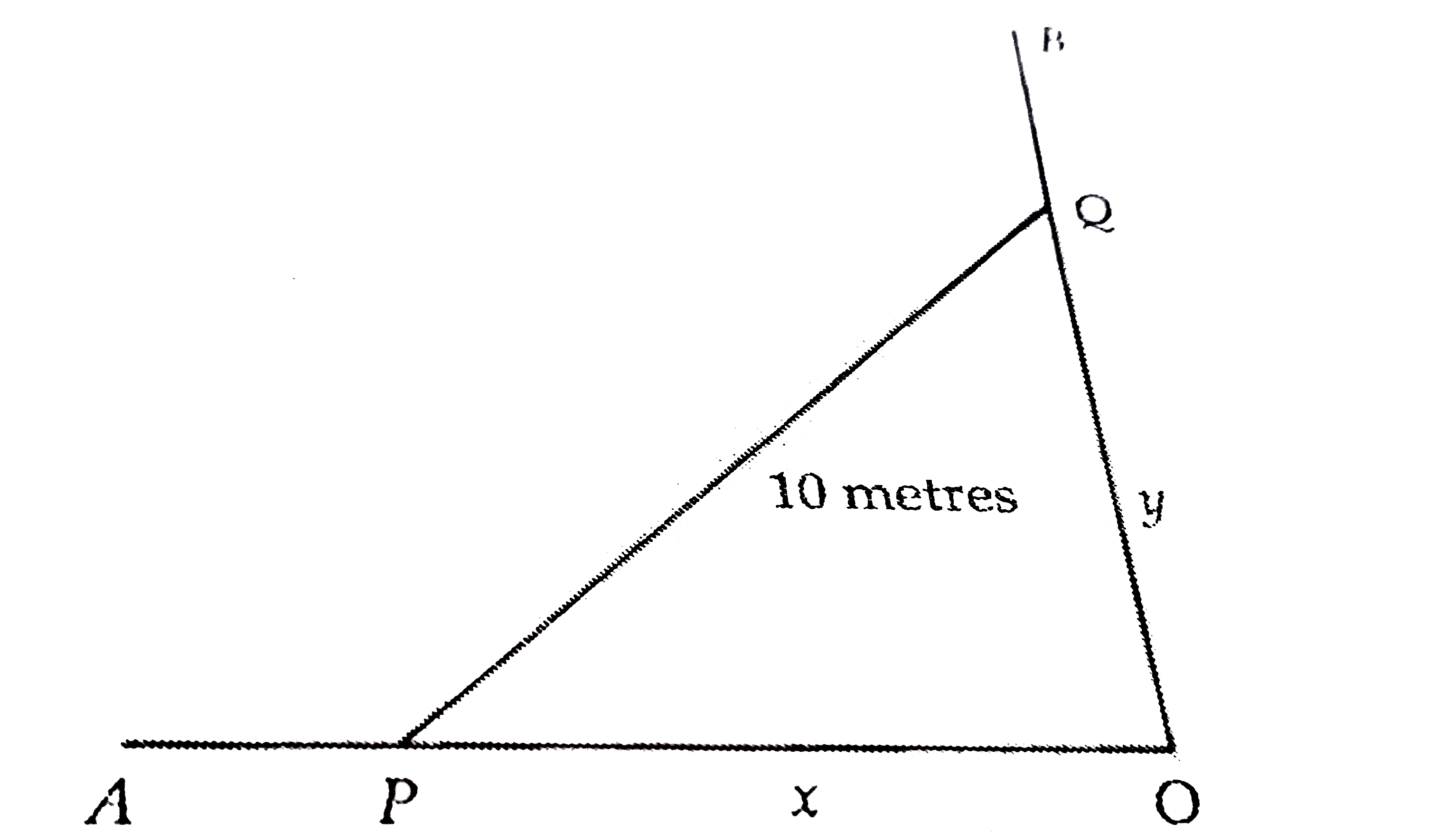A ladder 10 metres long rests with one end against a vertical wall, the other on the floor. The lower end moves away from the wall at the rate of 2 metres/minute. The rate at which the upper end falls when its base is 6 metres away from the wall
3 metres/min
2/3 metres/min
3/2 metres/min
none of these
The correct Answer is:C
Let at time t the lower end P of ladder PQ be at a distance x metres from the wall and the upper end Q be at height y from the ground. Then,
It is given that

We have to find when x = 6
Putting x = 6 in , we get y=8
Now,
metres/min
Topper's Solved these Questions
- DERIVATIVE AS A RATE MEASURER BOOK - OBJECTIVE RD SHARMACHAPTER - DERIVATIVE AS A RATE MEASURER EXERCISE - Exercise
26 Videos
- DERIVATIVE AS A RATE MEASURER BOOK - OBJECTIVE RD SHARMACHAPTER - DERIVATIVE AS A RATE MEASURER EXERCISE - Exercise
26 Videos
- DEFINITE INTEGRALSBOOK - OBJECTIVE RD SHARMACHAPTER - DEFINITE INTEGRALSEXERCISE - Chapter Test 2
60 Videos
- DIFFERENTIAL EQUATIONSBOOK - OBJECTIVE RD SHARMACHAPTER - DIFFERENTIAL EQUATIONSEXERCISE - Chapter Test
30 Videos
Similar Questions
Aladder of 5 m long rest with one end against a vertical wall of height 3 m and the other end on the lower ground. If its top slides down at the rate of 10 cm/sec, find the rate at which the foot of the ladder is sliding.
View SolutionA ladder 10 meter long is leaning against a vertical wall. If the bottom of the ladder is pulled horizontally away from the wall at the rate of 1.2 meters per seconds, find how fast the top of the ladder is sliding down the wall when the bottom is 6 meters away from the wall
View Solution
Knowledge Check
A ladder 10 m long rests against a vertical wall with the lower end on the horizontal ground. The lower end of the ladder is pulled along the ground away from the wall at the rate of 3 m/s. The height of the upper end while it is descending at the rate of 4 m/s, is
A4√3 mB5√3 mC5√2 mD6 mA ladder 10m long rest against a vertical wall with the lower end on the horizontal ground. The lower end of the ladder is pulled along the ground away from the wall at the rate of 3 cm/sec. The height of the upper end while it is descending at the rate of 4 cm/sec is
A4√3mB6 mC5√2 mD8 mA ladder of length 17m rests with one end agains a vertical wall and the other on the vessel ground. If the lower end slips away at the rate of 1ms−1 , then when it is 8m away from the wall, its upper end is coming down at the rate of
A58ms−1B−815ms−1C5π4ms−1D85ms−1
A ladder 10m long rests against a vertical wall. If the foot of the ladder is 6m away from the wall and the ladder just reaches the top of the wall, how high is the wall?
View SolutionIf a ladder which is 10m long rests against a vertical wall. If the base of ladder slides away from the wall at 1 m/s then how fast is the top of the ladder sliding down along the wall when the base is 6 m from the wall ?
View SolutionA 13-m long ladder is leaning against a wall. The bottom of the ladder is pulled along the ground, away from the wall, at the rate of 2 m/s. How fast is its height on the wall decreasing when the foot of the ladder is 5m aways from the wall ?
View SolutionA ladder 5 m in length is resting against vertical wall. The bottom of the ladder is pulled along the ground away from the wall at the rate of 1.5m/sec. The length of the highest point of the ladder when the foot of the ladder 4.0 m away from the wall decreases at the rate of
View SolutionA ladder 20 ft long leans against a vertical wall. The top end slides downwards at the rate of 2 ft per second. The rate at which the lower and moves on a horizontal floor when it is 12 ft from the wall is
View Solution
